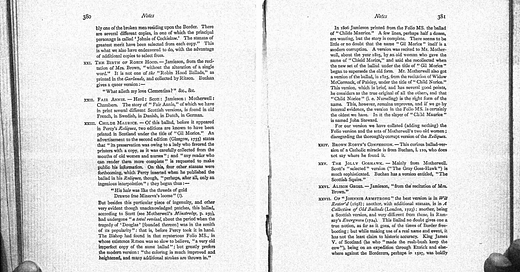ROUD 53: Bill Norrie
AKA Child Maurice, Child Morris, Bill Norrie, Gil Morice, Gil Maurice, Child Norris, Child Noryce
It’s easy to see why this was initially popular; it’s a great tragic family-drama of a story line with a really shocking twist, inspiring a popular play and attracting the attention of many publishers and poets ready to put their mark on it. Not so easy to see why it died out. Child collected around 15 versions around Scotland, but the ballad didn’t seem to travel (like many others of its type) across the Atlantic, and has only been found as a fragment once, in Newfoundland, Canada.
Music
On Bandcamp: A chiptune version - not sure which tune this is, if anyone wants to link it to a setting in Bronson, be my guest:
On Bandcamp - Gemma Khawaja, with the Carthy version:
On Bandcamp - another Carthy version all the way from rural Australia.
A fine a capella version from some handsome young rogue called Piers Cawley:
Books etc.
Francis Child’s narrative and other notes.
Extended discussion from Motherwell’s “Minstrelsy, ancient and modern: https://archive.org/details/minstrelsyancie00unkngoog/page/n150/mode/2up?view=theater
Summary in The Ballad Book (1872) by William Allingham, interesting, and not just for the inclusion of the digitizer’s digits:
Early ubiquity
The ballad was reportedy very popular in the 18th century, with many printings, especially following the success of the 1756 play called “Douglas” by John Home (after which the ballad was apparently considerably “revised” and “improved”) which was inspired by the story told in the song. Over the next couple of centuries, however, its popularity waned, and it didn’t spread across the Atlantic, save for a very brief fragment found in Canada in 1920. Kenneth S. Goldstein, in the sleeve notes of the Ewan MacColl recording, suggested on this basis that it was “extinct in tradition”. Although the way it is casually mentioned at the start of this 1910 article in an American folk journal seems to contradict that; it must have been fairly well known at that time to have been used as a passing reference.
Another folk music mystery.
Connection to Roud 52: Little Musgrave and Lady Barnard (Matty Groves)
Sometimes there’s speculation bandied about that this ballad is a corruption/evolution of Roud 52. Aside from the general theme of murderous jealousy, I don’t see a smoking gun of similitude. The idea might have arisen when the aforementioned play was first published, as the name Barnard was used, probably for some local spice. That’s about the extent of the evidence, though.
How long is it?
There have been many ways of expressing the, er, “generous” length of some old folk songs. Here’s a new one for me: in correspondence, the poet Thomas Gray wrote of this ballad in about 1757: "I have got the old Scottish ballad on which Douglas was founded; it is divine, and as long as from here [Cambridge] to Aston."
We’ll never know if he was talking about the time it takes to travel there, or the physical size once written out.





